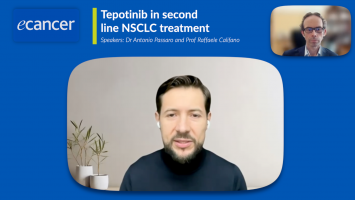The PRODIGE 23 trial was an academic trial which was done in 35 centres in France. The basis was that preoperative chemoradiotherapy followed by TME is the standard of care since 2004 and since that we have not improved overall survival. Even recently 25-30% of patients develop distant metastasis and adjuvant chemotherapy is probably not enough because compliance is usually poor. So the aim of this trial was to use FOLFIRINOX which has a high response rate in metastatic colorectal cancer to reduce the rate of relapse with metastatic disease.
The design was very simple, it was comparison between preoperative chemoradiation followed by surgery with TME and postop adjuvant chemo with six months FOLFOX or capecitabine according to treatment choice. We compared that to six cycles of up-front FOLFIRINOX, the same chemoradiation, the same surgery and three months of the same adjuvant chemo FOLFOX or capecitabine. So the only difference between the two arms for the same duration of chemotherapy was three cycles of chemotherapy before. So it was perioperative chemotherapy as compared to adjuvant chemotherapy in T3/T4 rectal cancer.
What did you find?
The main result of the trial was that compliance of six cycles of FOLFIRINOX was good with nearly 92% of patients who received the six cycles. The compliance to chemoradiation was the same but, as usual, 8% of the patients in the FOLFIRINOX arm discontinued capecitabine before the end of radiation. At restaging before surgery there was less metastatic disease in the up-front chemotherapy arm and the difference is significant. There was at surgery less non-therapeutic laparotomy due to perioperative detection of multiple metastases which were not detected at CT scan before surgery, less unresectable or R2 resection. The morbidity was the same and it was good surgery with only 14% of total abdominal perineal resection and 96% of the patients had total mesorectal excision, no R1 resection. The postoperative mortality was significantly reduced in the up-front chemotherapy arm.
When we look at postoperative pathology findings there were more than twice as many tumours classified at T0 N0 in the FOLFIRINOX arm, the difference is 27.8% versus 12% and, of course, it is significant. Adjuvant chemo was better tolerated in the FOLFIRINOX arm, even if you look at only the three first months of treatment and at the end of the treatment less neuropathy in the FOLFIRINOX arm. The most important result for the patients is we have a significant increase in DFS and it was our aim endpoint, primary endpoint. We have also less metastasis and the difference was significant with no differences in overall local relapse rate which was less than 5% in the FOLFIRINOX arm.
So FOLFIRINOX is a safe regimen with manageable toxicities and does not impair overall treatment feasibility and tolerance in T3/T4 rectal cancer. We had increasing pCR, curative intent surgery, DFS, metastasis free survival and also better quality of life results over time with, for example, less impotence. So we think that these are great results for the patients with T3/T4 rectal cancers.
What do you think will be the clinical implications of the trial?
First, it’s feasible, tolerance is good with only one sudden death and much more toxic effect and toxic death in the standard arm. It’s probably more easy to begin with FOLFIRINOX in patients with good cardiovascular disease and good performance status 0 or 1 and this is the large majority of patients with rectal cancer. It’s probably more safe and more easy to begin with cycles of chemotherapy even if you change a bit the dose and then to go to chemoradiation after and even surgery and adjuvant chemo. So it’s a feasible scheme. It’s now the basis for multiple randomised studies which are ongoing in France to further improve surgical results.








